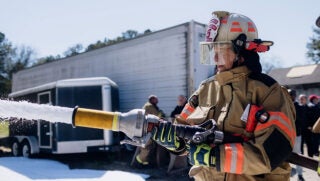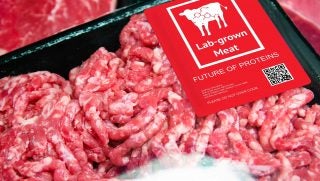A new farm is launching in Boulder County, Colorado, one that hopes to serve “sass and veggies for the Colorado queers, straights, and everyone in between.” Cleverly named Off Beet Farm, the business was founded by friends Kyle Stewart and Emmy Bender, both of whom identify as LGBTQ.
Kyle and Emmy met while working at Kilt Farm and each has extensive years of experience working on farms — Emmy began in southwest Virginia and Kyle began in New Jersey. Yet neither had strong ambitions for a career in agriculture in the beginning.
Emmy’s introduction to farming was with livestock agriculture, and she recalls how being female in that male-dominated sphere felt strange and alienating at times. She saw firsthand how her mother, who conducted research on grain crops, faced resistance and discrimination from growers, and it wasn’t until she took a fellowship with Food Project in Boston that her perspective on what a farmer looked like changed.
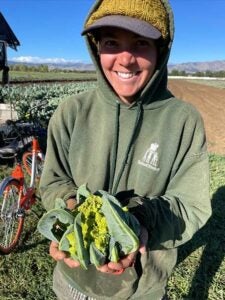
During her time at the fellowship, she met a lot of young, radical farmers, many of whom were queer like her. Meeting others who differed so greatly from what a farmer looked like growing up in rural Virginia changed her perspective on who could be a farmer and what that lifestyle could look like.
From then on, Emmy knew that she wanted to pursue farming full time, on her terms.
Kyle, on the other hand, did not grow up with lots of exposure to agriculture — his parents were office workers, and he had little interest in farming as a career. His first farm job was simply a means to earn some cash and gain access to a car, since it was a requirement of his parents to hold a job if he wanted to drive their car around. However, his experience toiling in the field showed him that he was certainly capable of farming, and he revisited this industry after undergoing an existential crisis over his future as a university student.
During his university days, Kyle learned more about food systems and the importance of agriculture and decided to work on a farm again to see if it was something he could enjoy. This changed his perception of farming, and Kyle knew he wanted to continue farming.
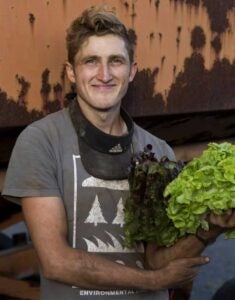
Both Emmy and Kyle moved to Colorado over a year ago with their respective partners. While working in the field together at Kilt Farm, they realized how similar their values and career goals were and decided to become business partners.
“The cliché of farming is that it’s a family business, but what happens if your partner doesn’t want to, how do you do it on your own?” Emmy said.
One main aspect that they said drew them together was the fact that they were both certain in their desire to continue farming long-term. Many farmers they met did not share this certainty and were not committed to launching a farming business.
“I’ve never met anyone who worked so hard,” Kyle said of Emmy. “And knowing how hard farming is, why try to do it all on your own?”
Emmy and Kyle had worked on multiple farms and knew that being farm hands did not always promise regular work season after season. Having your own farm eliminated this problem, but they each felt that launching a farm solo would be a herculean task to take on.
Prompted by the collaborative work atmosphere that they found on the farms they worked on, they realized that having a partner would be the best solution. They also cite the benefits of having their partner not be their romantic partner, such as being able to have vacations and alternating who tends to the farm while the other is away. They said having a business partner also makes them more accountable and organized when it comes to the operational aspects of the farm.
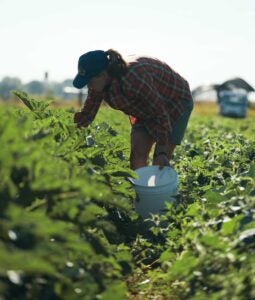
Knowing that neither of them makes any decision solo, Emmy and Kyle had to learn a great deal about communicating with each other and how to organize their documents and paperwork so that the other could easily access them when needed. While this can oftentimes be challenging, both feel that it is a rewarding dynamic that ultimately is beneficial for them.
As farmers who identify as LGBTQ, they also understand the importance of being allies united in their business venture. Their tagline is “the gayest little farm in Boulder,” and while they are excited to promote their business at farmer’s markets in Boulder and Longmont this upcoming growing season, Kyle does feel some apprehension at how signs with their tagline will be received at the markets.
Knowing that a lot of their interactions with ordering equipment and materials are done with suppliers in regions where a traditional mindset is more commonplace, they are also glad that they did not choose a more explicitly LGBTQ name for their fledgling company. While lucky to have never faced any direct discrimination in their farming experiences, both Kyle and Emmy are very aware of the space that they are inhabiting — a space which has historically and traditionally not been very open and accepting to minority and underrepresented groups.
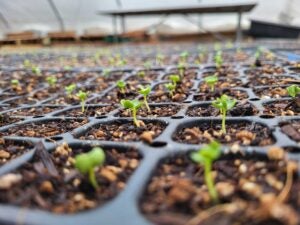
Still, they believe that the future of agriculture has space for them, and are not afraid to actively create and foster that space for themselves and others.
When asked about their vision for the future of farming, both expressed their desire to see more small farms, and the perception of farming shift so that it can be seen as a viable career option for youth and those who want to pursue it full-time. Another change they hope to see is the blurring of the “hierarchy” on a traditional farm, where only the owner is seen as a “farmer” and the other employees are regarded as field workers or field hands.
They hope to foster a farm environment where every individual can be a farmer, make a livable wage, and be free to nurture and validate their desires to grow food and be who they are, whatever that looks like.
Liza Thuy Nguyen serves as the 2023 American Farmland Trust Agriculture Communications Intern at AGDAILY, with a focus on helping to amplify diversity and minority voices in agriculture. Liza is originally from Anaheim, California, and attended the University of California, Davis, as a first-generation college student. She received a bachelor’s degree in genetics and genomics and went on to earn a master’s in horticulture from Penn State.



